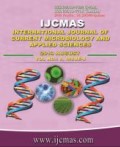


 National Academy of Agricultural Sciences (NAAS)
National Academy of Agricultural Sciences (NAAS)

|
PRINT ISSN : 2319-7692
Online ISSN : 2319-7706 Issues : 12 per year Publisher : Excellent Publishers Email : editorijcmas@gmail.com / submit@ijcmas.com Editor-in-chief: Dr.M.Prakash Index Copernicus ICV 2018: 95.39 NAAS RATING 2020: 5.38 |
In the present study 128 samples collected from 66 ducks of various breeds like Batak(28), Moti(34) and Khaki Campbell (6) out of which 112 number of samples from 52 dead birds and 16 number of samples from live birds. blood, liver, swabs from femur bone marrow and also swabs from foot lesions were collected consists of 128 samples in which blood sample (12), swabs from foot lesions(26) of live birds and liver(22), lungs(30) and swab from bone marrow (38) of dead birds. All the samples were processed for routine microbial isolation and identification. Pasteurella species was found to be the most predominant isolate (16%) followed by Pseudomonas species was found to be (11.2%) and E.coli (55%) where as fungal isolates like Aspergillus species was found to be (18%). Pasteurella species were cultivated in 5% sheep blood agar and McConkey’s agar whereas Aspergillus species in SDA by routine inoculation procedure. The ducks were ranging from 2 to 16 weeks of age mostly from unorganised sectors of Odisha. Ducklings were found to be more prone to Pseudomonas and Aspergillus species in comparison to adult ones on antibiotic sensitivity test.it was revealed that tetracycline, doxycycline, oxytetracycline, found to be least sensitive in disk diffusion method. Whereas gentamicin, and ciprofloxacin were found to be highly sensitive against E.coli and gentamicin, amikacin, tobramycin were found to be highly sensitive against Pseudomonas species. Most of the gram negative bacteria isolated in the present study like Pasteurella species, Pseudomonas species and E.coli species were found to be resistant to tetracycline, amphotericin-B. griseofulvin were found to be highly sensitive for Aspergillus species isolated in the present study.
 |
 |
 |
 |
 |